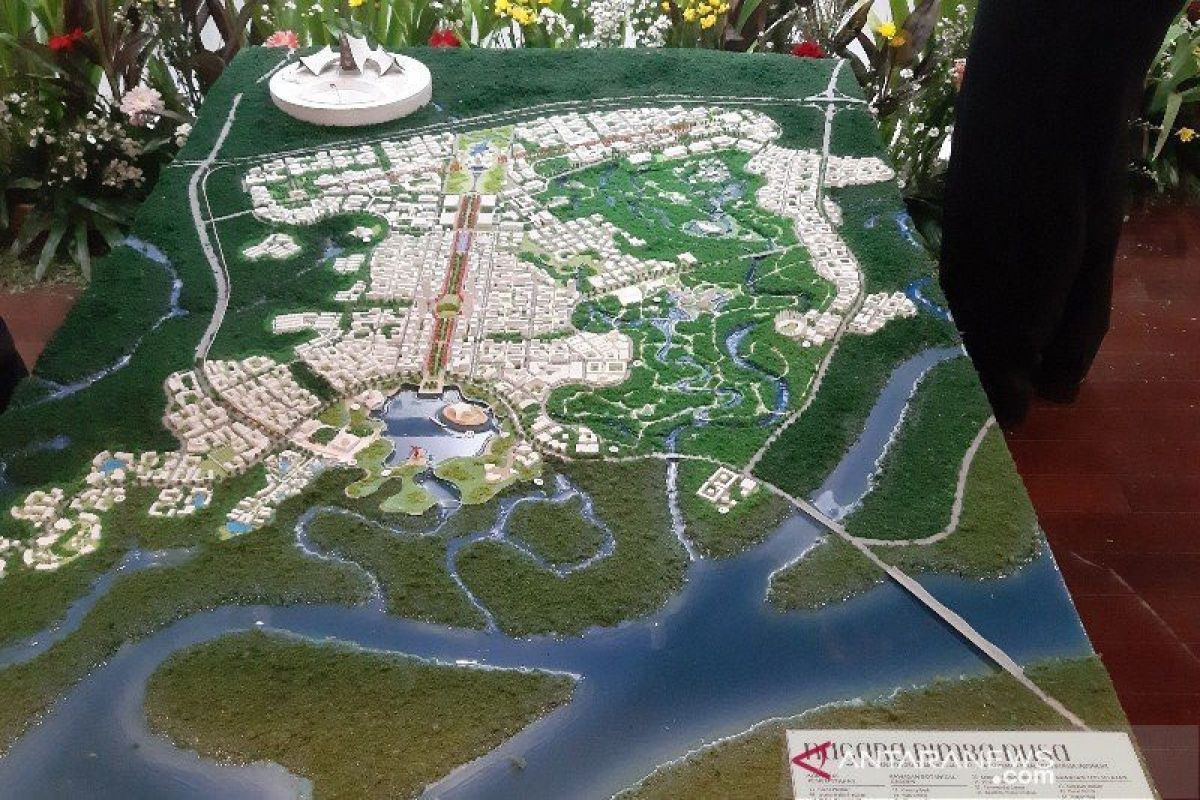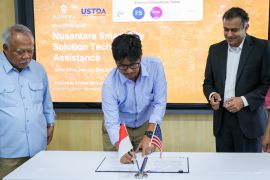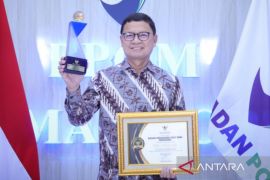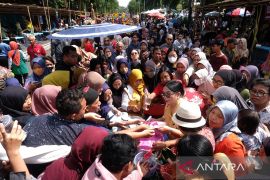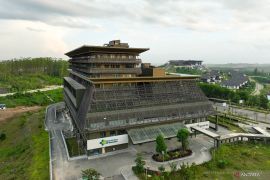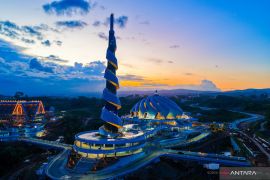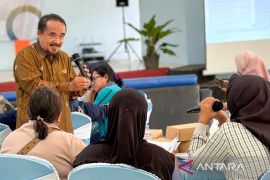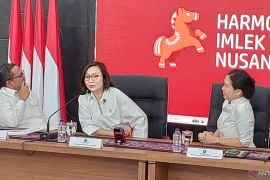By seeking God's approval and permission and support of the House members, our nation's ancestors, and of course, all Indonesians, I request consent to move the capital to Kalimantan IslandJakarta (ANTARA) - "By seeking God's approval and permission and support of the House members, our nation's ancestors, and of course, all Indonesians, I request consent to move the capital to Kalimantan Island," President Joko Widodo (Jokowi) stated.
Jokowi made the public call during his speech address to mark Indonesia's 74th Anniversary Day at a joint session of the House of Representatives (DPR) and the Regional Representatives Council (DPD) in 2019.
The president's call marked Indonesia's new phase wherein it will transfer the capital from Jakarta to Penajam Paser Utara, East Kalimantan.
A big factor behind the capital relocation decision was that Jakarta has borne a heavy burden of responsibilities as the country's center of governance, business, finance, and trade whilst contributing 18 percent to Indonesia's total GDP.
Initially, the president's request to the public had brought to the fore both pros and cons, recalling the fact that the national capital transfer (IKN) requires support from the government and society.
Related news: National capital relocation to help realize Vision 2045: minister
In solidifying the legal certainty and starting the capital transfer and infrastructure construction, RUU IKN, or the National Capital Bill, was drafted thoroughly following the president's decision.
RUU IKN regulates the units and committee that are assigned to prepare for the capital transfer, spatial design, land ownership title transition, environment, disaster mitigation, financing, budget, and security.
A special committee for RUU IKN was formed in December 2021 comprising the House of Representatives and government for delving deeper into the articles of RUU IKN.
In making the points of RUU IKN effective, the special committee had consulted with academicians from Hasanuddin University in South Sulawesi and Mulawarman University in East Kalimantan.
Finally, the House of Representatives approved to pass the RUU IKN into law during the plenary meeting on January 19, 2021.
Related news: New IKN development to prioritize basic infrastructure: Task Force
New infrastructure and government systems
According to the National Development Planning Ministry (Bappenas), the National Capital Law stipulates that the IKN construction process will be executed until 2045, with focus on funding schemes and fiscal sustainability.
The IKN infrastructure development is divided into five phases, with the 1st phase being from 2022 to 2024, and the 2nd to 5th phase from 2025 to 2045.
Meanwhile, Indonesia's new capital is named Nusantara, meaning archipelago, which describes the conceptualization of Indonesia's geographical territories that unite islands with the ocean.
Nusantara will be developed into a global sustainable city that upholds the ecological balance, with the objective of becoming the national identity and symbol.
The IKN regional government will hold a special status and have the same level as a province.
The Nusantara Special Regional Government or the IKN Authority has power similar to the ministry wherein it will manage the use of budget and goods. For instance, land ownership by the IKN Authority will utilize the mechanisms of forest zone release and land procurement based on the existing law.
Furthermore, the new capital's spatial design will comply with the master plan's eight principles: in order with the natural conditions; Bhinneka Tunggal Ika or Unity in Diversity; connected and active; low-carbon emissions; circular and resilient; safe and accessible; comfortable and efficient by technology; and inclusive economic opportunities.
Related news: Jokowi to issue regulation on national capital's governing authority
IKN Budgeting
The Indonesian government saw the total budget required for IKN to reach about US$32.5 billion, or Rp466 trillion, that will be sourced from the state budget of Rp89.4 trillion, Rp253.4 trillion from Public-Private Partnership, and Rp123.2 trillion from the private sector.
Finance Minister Sri Mulyani Indrawati stated that the capital transfer is included in the budget of the national economic recovery (PEN) program, considering a budget cap of Rp450 trillion, with ambiguity over where it should be utilized.
During the 2023-2024 period, the budget for constructing the new capital will be adjusted in line with developments in the pandemic situation and the 2024 General Elections. For the 2025-2045 period, the Ministry of Finance is still estimating the medium- and long-term budget requirements while preserving financial stability.
The government has also ensured that the IKN development funding will not interfere with the handling of COVID-19 and PEN programs, such as social assistance for the community.
National Development Planning (PPN) Minister and Head of the National Development Planning Board (Bappenas) Suharso Monoarfa assessed that the long-term use of budget aims to protect the IKN infrastructure from the risk of halting midway due to its development that takes decades.
On the other hand, Indrawati highlighted other funding sources apart from PEN as the budget for IKN in case its implementation violates Law No. 2 of 2020 that is the basis for the distribution of PEN funds. For instance, the finance minister stated that the IKN budget can use the Public Works and Public Housing Ministry's budget of Rp110 trillion in 2022.
Related news: New capital construction must not strain state budget: deputy speaker
Future identity and economic magnet
The name Nusantara was decided, as it reflects Indonesia's diversified geographies and cultures. Nusantara unites the plethora of diversities by realizing a social foundation to improve public welfare while forging ahead to realize the vision of Golden Indonesia in 2045.
Nusantara aims to be a global city that is sustainable and inclusive by recovering and maintaining the environmental conditions and by being emblematic of the people living in the city.
The vision of the capital city is underlined in three main objectives -- identity, social character, and the nation's unity and greatness -- that mirror the 1945 Constitution and the Pancasila values.
Nusantara, as a future city, will manage resources smartly and provide services effectively. This management will cover the utilization of water and energy resources, the integrated transportation modes, and the realization of a liveable and healthy city.
The new capital will become Indonesia's new economic driver, given its strategic location in the international trade routes. Hence, it is viewed as being able to boost the welfare of society.
Related news: No PEN funds for capital if law does not allow: minister
Nusantara is located in the middle of the seabed of Indonesian islands (ALKI II) in Makassar Strait that acts as the major national and regional sea lanes.
An airport, seaport, toll road, and networks of drinking water and energy are located near the new capital city in addition to its proximity to the developing cities of Samarinda and Balikpapan.
The capital transfer will close the economic gaps between Java and other regions in Indonesia. The effort aligns with the Golden Indonesia 2045 vision that targets the country to rank among the top five strongest economies in the world.
Related news: S Sumatra: Chinese investor evinces interest in seaport construction
Related news: Ministry invites public to participate in G20 events
Editor: Fardah Assegaf
Copyright © ANTARA 2022
